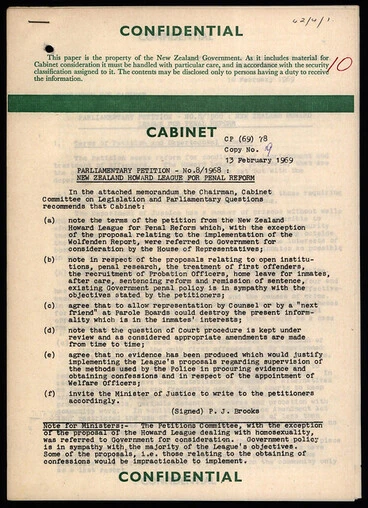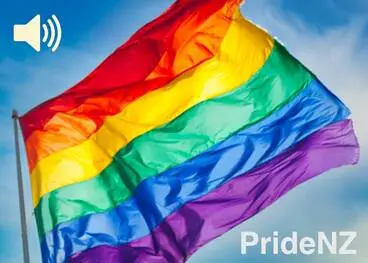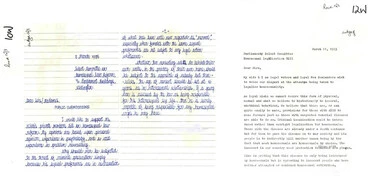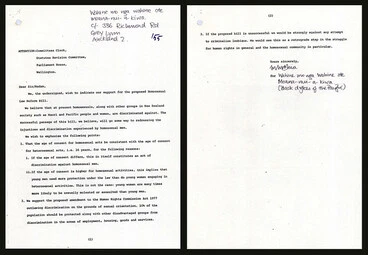Homosexual Law Reform in Aotearoa New Zealand
A DigitalNZ Story by PrideNZ
Learn about homosexual law reform through a rich collection of interviews, film footage, correspondence and ephemera from throughout Aotearoa
homosexual, law reform, fran wilde, activism, protest, human rights, equality, lgbti, parliament, 1980s, politics
Prior to the Pākehā colonisation of Aotearoa New Zealand in the 1800s, Māori society accepted a diverse range of sexualities and genders, according to academic Dr Elizabeth Kerekere. Then in 1840, with the signing of Te Tiriti o Waitangi/Treaty of Waitangi, and the subsequent adoption of English law, male same-sex love became a crime.
From 1840 until 1986, homosexual activity between men in this country was made illegal. Punishments ranged from flogging - to imprisonment with hard labour - to execution. These harsh, anti-homosexual laws only began to be widely challenged from the 1960s onwards.
In 1963, a legal sub-committee of the Dorian Society (the first recorded gay organisation in Aotearoa) began investigating the possibility of law reform, and by the late 1960s the New Zealand Homosexual Law Reform Society had been established. One of their first actions was to petition Parliament. The petition, signed by 75 courageous New Zealanders, called for the decriminalisation of homosexual acts between consenting males aged 21 and over.
While the petition was unsuccessful, the push for social reform continued here, as well as internationally. By the late 1960s, homosexual acts in England and Wales had been partly decriminalised. And in late June 1969, the Stonewall uprising occurred in New York City, USA.
Stonewall ignited activist energy around the world - including in Aotearoa. On the 15 March 1972, after being denied a visa to enter the USA because of her sexual identity, Auckland University student Ngahuia Te Awekotuku stood up at the university and shouted "Let's start a revolution!"
1972 became a landmark year for Gay Liberation in Aotearoa. Listen to Vernon Tile Vamaua talk about the significance of that year in the audio podcast below.
Then in 1974, the first major parliamentary attempt at homosexual law reform was made in Aotearoa with legislation championed by National MP Venn Young. Listen to the last part of the Crimes Amendment Bill debate below.
1968 Petition to Decriminalise Homosexuality
Archives New Zealand Te Rua Mahara o te Kāwanatanga
An amendment to Venn Young's bill was put forward by Labour MP Gerald Wall. Wall's amendment set out to make it illegal for anyone, except for “a clergyman or a registered medical practitioner”, to speak about homosexuality to anyone under the age of 20. Anyone breaking Wall’s amendment would face up to two years imprisonment. This drew a swift response from rainbow communities who faced-off with Wall on the steps of Parliament (image below). His amendment was subsequently voted down.
Ultimately, Young's Crimes Amendment Bill was defeated, with only 29 MPs voting in favour, 34 against and a massive 24 abstentions. However, the issues and activists weren't going away. Another parliamentary attempt at law reform was made in 1979/80, and then on 8 March 1985 Labour MP Fran Wilde introduced a private member's bill.
Fran Wilde's Homosexual Law Reform Bill set out to decriminalise consensual sexual activity between males over the age of 16 and make it illegal to discriminate on the grounds of sexual orientation. Listen to the introduction of the Bill below.
For an exhausting 16-months, homosexual law reform created heated debate both in parliament and around the country. It was covered regularly in television news bulletins and in current affairs programmes. Highlights from the television footage can be seen in the compilation Thin Edge of the Wedge (below).
Community radio also played an important part in documenting pro-law reform activities. A rich selection of community radio coverage from the time can be heard in the Radio Gala programme below. Photographer David Hindley also captured many of the public events around Wellington. You can view his images below and hear him talk about how, and why the photographs were taken.
Radio Gala (8 July 1990)
PrideNZ
David Hindley images
PrideNZ
Leaflet, 'March for Lesbian & Gay Rights'
Museum of New Zealand Te Papa Tongarewa
Activism and activists come in many forms. For example, Chrissy Witoko was the owner of the Evergreen Coffee Lounge in Wellington in the 1980s/90s. She offered both a safe inclusive meeting place, and employment opportunities for members of the rainbow communities during (and after) the period of law reform. The walls of the Evergreen were decorated in large photographic collages - filled with images of community members and activists from the 1970s-2000s. Many of the collages have been digitised and can be seen in high-resolution via Te Papa's Collections Online.
Another activist was Neil Costelloe. His activism ranged from simply standing on a busy city street kissing his boyfriend, to designing rally and march posters in support of homosexual law reform (pictured below). You can listen to his sister, Jayne Costelloe, remembering Neil in the audio podcast below.
Collage
Museum of New Zealand Te Papa Tongarewa
'March in Support of the Homosexual Law Reform Bill' poster
Museum of New Zealand Te Papa Tongarewa
Remembering Neil Costelloe
PrideNZ
Throughout 1985 and 1986, pro-law reform street marches and rallies occurred throughout New Zealand. Often joyful, they also attracted anti-reform protestors. At one march in Wellington, a protestor wore a "Gay + Gay = AIDS" t-shirt.
The emergence of AIDS was used as a key argument by both sides in the homosexual law reform debate. Pro-reformers maintained that decriminalisation of homosexual activity would allow for better health care and education, while anti-reformers claimed that it would simply legalise the spread of AIDS. According to anti-reformer, National MP Norman Jones, it would be better for people with AIDS to die "sooner rather than later" to help prevent law reform.
"Feilding Gay Task Force flank Salvation Army centennial march"
Palmerston North City Library
Anti homosexual law reform protestor, Wellington, New Zealand - Photograph taken by Ross Giblin
Alexander Turnbull Library
In 2015/16, to mark the 30th anniversary of homosexual law reform, some high-profile activists were audio interviewed about their involvement. Listen below to Dr Elizabeth Kerekere, Bill Logan and Tighe Instone - with more interviews available on the PrideNZ website.
One of the key moments during homosexual law reform was the presentation of a petition opposing law reform to Parliament. The Salvation Army had agreed to co-ordinate the petition, with Colonel Campbell telling Salvationists that the moral decay of civilisation was proceeding unchecked and that it was in many ways a greater threat than that of nuclear destruction. The petitioners claimed that there were over 800,000 signatures (almost 1 in 4 New Zealanders). However it was later found that the petition contained multiple signatures in the same hand and other forgeries. Critics of the petition likened the presentation to a Nazi Nuremberg Rally, with a platoon of young uniformed people carrying flags and wearing sashes that read "For God, For Country, For Family." Images taken for Wellington newspapers can be seen below.
Newspapers from the time are a rich source of information - and the MaLGRA scrapbook (below) offers a fascinating selection of newspaper clippings. Established in 1977, MaLGRA (Manawatu Lesbian and Gay Rights Association) is Aotearoa's longest running rainbow rights and social organisation. It was very active during the law reform period.
MaLGRA Scrapbook
Palmerston North City Library
Petition against homosexual law reform presented at Parliament, Wellington, New Zealand
Alexander Turnbull Library
Hugh Young was at the presentation of the petition at Parliament on 24 September 1985. Confronted by a large homophobic crowd, he stood strong with other pro-reformers. He courageously held up the sign "I Signed 27 Times." Young was also a member of H.U.G. (Heterosexuals Unafraid of Gays). He was audio interviewed about his involvement a few years ago.
'I signed 27 times' placard
Museum of New Zealand Te Papa Tongarewa
HUG badge
Museum of New Zealand Te Papa Tongarewa
The Select Committee considering the proposed law received many submissions - both for and against. A sample of these submissions is held at Archives New Zealand. You can see some examples below, and there is also an audio interview with Lenette Breytenbach about what the archive holds in relation to law reform.
Homosexual Law Reform Bill Passed
Archives New Zealand Te Rua Mahara o te Kāwanatanga
Homosexual Law Reform submission
Archives New Zealand Te Rua Mahara o te Kāwanatanga
After 16 months of debate, Part 1 of the Homosexual Law Reform Bill was narrowly passed by Parliament, 49 votes to 44. Part 2 of the Bill dealing with anti-discrimination measures was lost in April 1986. It wasn't until the Human Rights Act 1993, that it became illegal to discriminate against homosexuals in the areas of accommodation, employment and services.
MP Fran Wilde remembers the campaign for homosexual law reform brought a flood of "terrible phone calls and terrible letters...[but] despite the discomfort it's worthwhile." In the year's since, there have been a number of panel discussions featuring Dame Fran and others reflecting on homosexual law reform. Listen below.
Pride flags fly at Parliament, Wellington, New Zealand
Uploaded by DigitalNZ user PrideNZ
During the heated debates in the mid-1980s, Labour MP Geoff Braybrooke, who was against law reform, warned the country that reform would be the "thin edge of the wedge... It could well lead to gay bars, gay massage parlours, gay churches, gay marriages... and gay people adopting children."
And this is ultimately what happened. And rather than the world imploding, Aotearoa became a little more equal for all of us - regardless of who you love.
This DigitalNZ story was compiled in July 2023 by PrideNZ





